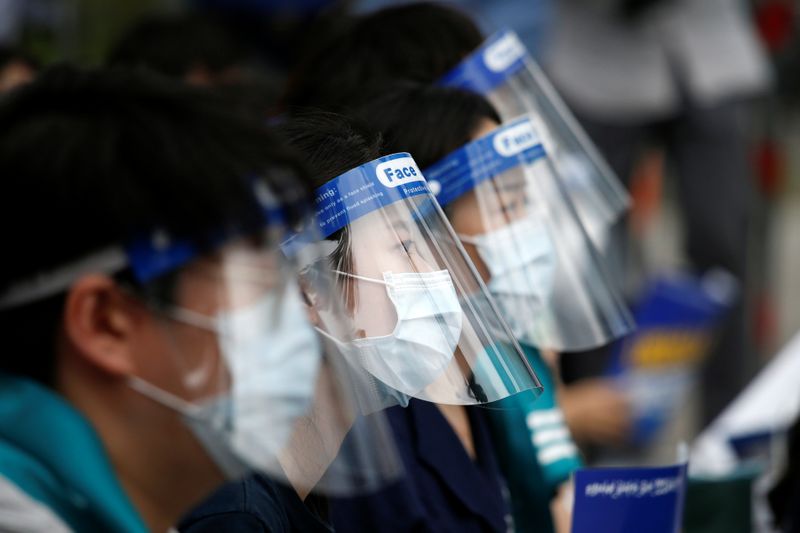
FILE PHOTO: Medical residents and doctors attend a 24-hour strike amid the coronavirus disease (COVID-19) pandemic to protest a government plan to increase medical school admissions by 400 a year for the next decade to prepare for potential infectious disease outbreaks, in Seoul, South Korea, August 14, 2020. REUTERS/Heo Ran
August 18, 2020
By Sangmi Cha
SEOUL (Reuters) – South Korea tightened social distancing rules on Tuesday as it reported a three-digit increase in novel coronavirus cases for a fifth day and authorities scrambled to trace hundreds of members of a church congregation.
The Korea Centers for Disease Control and Prevention (KCDC) reported 246 new cases as of midnight on Monday, bringing its total infections to 15,761, with 306 deaths.
South Korea has been one of the world’s coronavirus mitigation success stories but it has suffered repeated spikes in cases.
Two days after re-imposing stricter social distancing in Seoul, the government expanded the curbs to include the port city of Incheon, while ordering the closure of nightclubs, karaoke bars, buffets and cyber cafes.
It also banned all in-person church services and indoor gatherings of 50 people or more and outdoor ones of 100 or more.
“If we can’t get the virus under control now we’ll have to notch up social distancing to higher levels, and that would have a big impact on our economy and people’s livelihoods,” Prime Minister Chung Sye-kyun told a news conference after an emergency meeting.
At least 457 infections have been linked to the Sarang Jeil Church, 10 of whom were confirmed to have attended anti-government demonstrations on the past two weekends in Seoul, Vice Health Minister Kim Gang-lip told a briefing.
Authorities were trying to trace some 500 other members of the congregation to tell them to self-quarantine and get tested as they posed the highest transmission risk, Kim said.
This was the second time a church was at the centre of a serious outbreak in South Korea.
‘GRAVE CROSSROADS’
In February, authorities struggled with an outbreak that emerged in a secretive Christian sect in the city of Daegu, which turned into the country’s deadliest cluster.
The KCDC has warned that the new cases posed a greater crisis than the earlier church outbreak and could swamp the health system.
“If we fail to contain the spread in the Seoul metropolitan area of 25 million population this week, it can not only halt the daily routine of everyone but also put the safety of the elderly and the weak at risk,” KCDC deputy director Kwon Jun-wook told a briefing.
Another cluster has been traced to a Starbucks Corp outlet outside Seoul with seven new cases taking the tally there to 49.
Two new cases were reported in the military, bringing the total number of infections on bases to 88, the defence ministry said.
Some 461 military personnel were in quarantine, and all troops have been confined to base, with leave cancelled and visits halted.
Authorities have set out social distancing rules in three stages, with stage 1 the least strict and stage 3 the toughest, when schools are shut, businesses are advised to work from home and gatherings limited to 10 people.
Seoul is at stage 2 but Kwon said the effort was at a “grave crossroads” and stage 3 might be inevitable.
“High-risk gatherings in the greater Seoul area could spread nationwide,” he said.
(Reporting by Sangmi Cha; Additional reporting by Hyonhee Shin; Editing by Simon Cameron-Moore, Robert Birsel)

